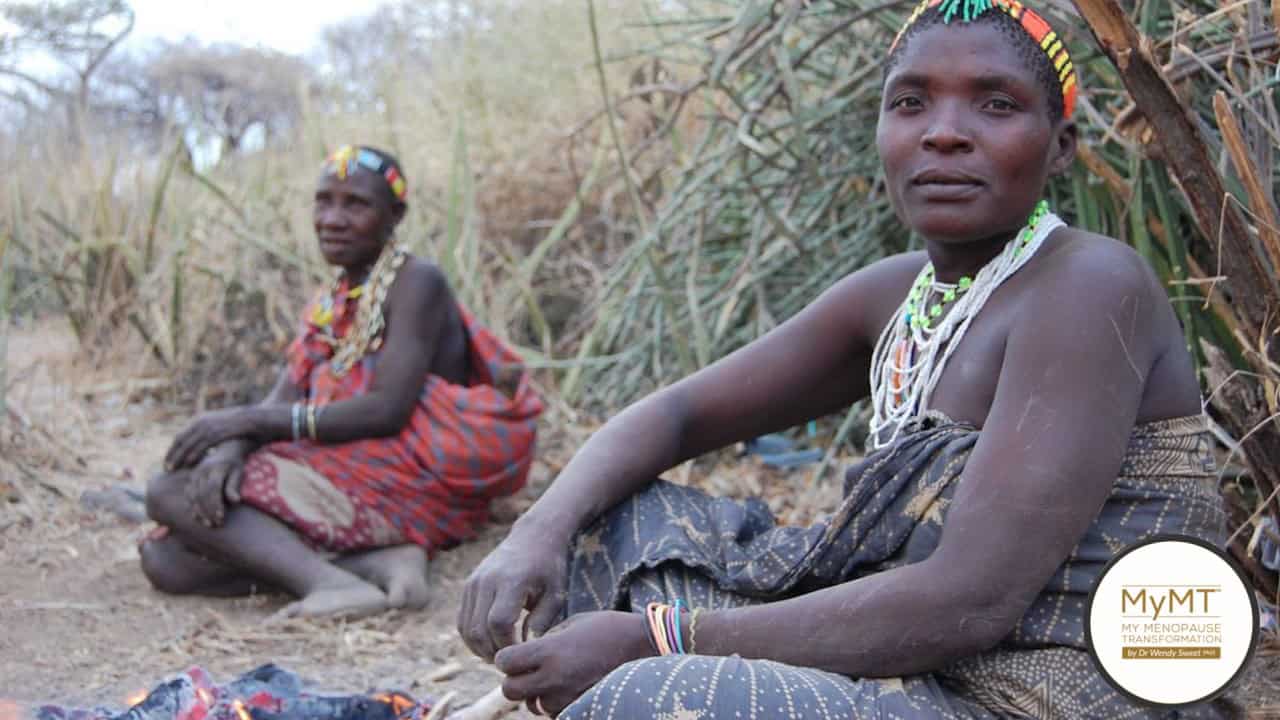As if the hot flushes, lack of sleep, sore joints, exhaustion and itchy skin weren’t complicated enough, then along comes vaginal dryness too. “What next?” I hear you cry, as one of the ladies also said when she messaged me about it recently. Dryness ‘down there’ caught me off-guard – so too did the pelvic floor changes. Suddenly there you are, enjoying intimacy with no pain or dryness and then you arrive in peri-menopause or menopause and your ‘girl’s bits’ become dry and painful.
When I read Dr Katie Fitzpatrick’s extraordinary doctoral research on the Hadza women who were in menopause and post-menopause, and discovered that the only symptom they complained about was vaginal dryness, I wasn’t surprised. The Hadza, residing near Lake Eyasi in northern Tanzania, represent one of the last remaining hunter-gatherer populations.
Whilst the Hadza women didn’t have a word or phrase for menopause, the post-menopausal women interviewed were asked about hot flushes, menstrual irregularity, pain during sex and vaginal dryness. No woman reported hot flushes and no woman reported menstrual irregularity. Reports of pain during sex were mixed but vaginal dryness was reported by more of the women. “From my perspective”, wrote Dr Fitzpatrick (2018), “when asked about vaginal dryness, the ‘yes’ answers were particularly emphatic for this question. The women were animated, they repeated ‘yes’ more than once and they added adjectives like “very, very dry” and “completely dry”.
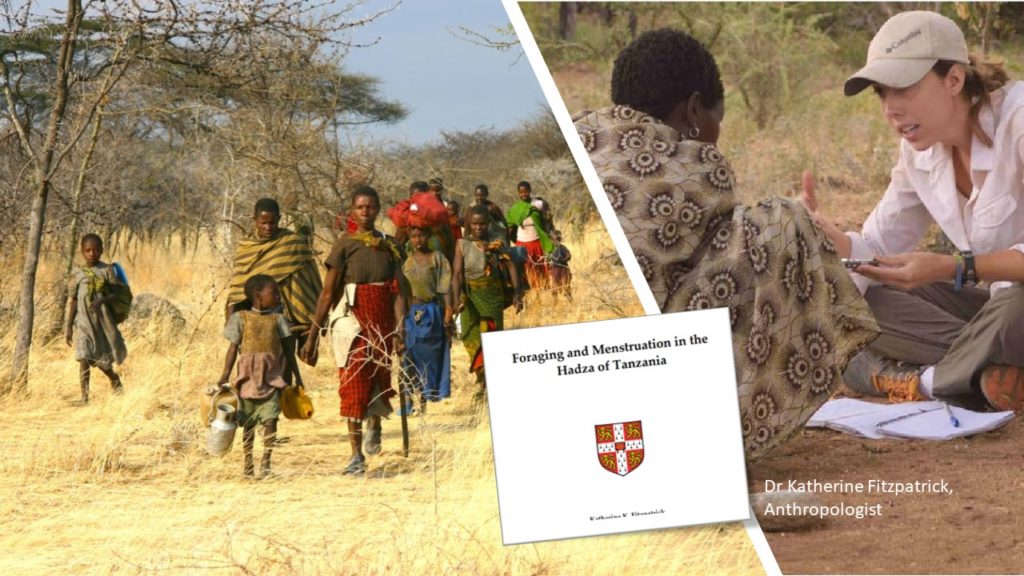
As I explored the research behind the amazing journey that Dr Fitzpatrick had been on writing about menstruation and foraging behaviours of Hadza women, I thought to myself, I wish she had asked them if they use any native herbs to reduce the dryness and provide better lubrication for them.
If the Hadza women do use natural herbs found whilst foraging, I wonder if these are similar herbs that New Zealand Herbalist, Georgina Langdale, has in her Feminine Balm (NatFem Balm) – a non-oestrogen containing balm, that she manufactures from herbs, olive oil and other natural ingredients found in nature, to remedy the age-old menopausal problem of vaginal dryness. I send lots of New Zealand women her way, but as she explained to me this week, she sells this product all around the world. If you are frustrated by your dry girls’ bits, then check out her herbal balm HERE.
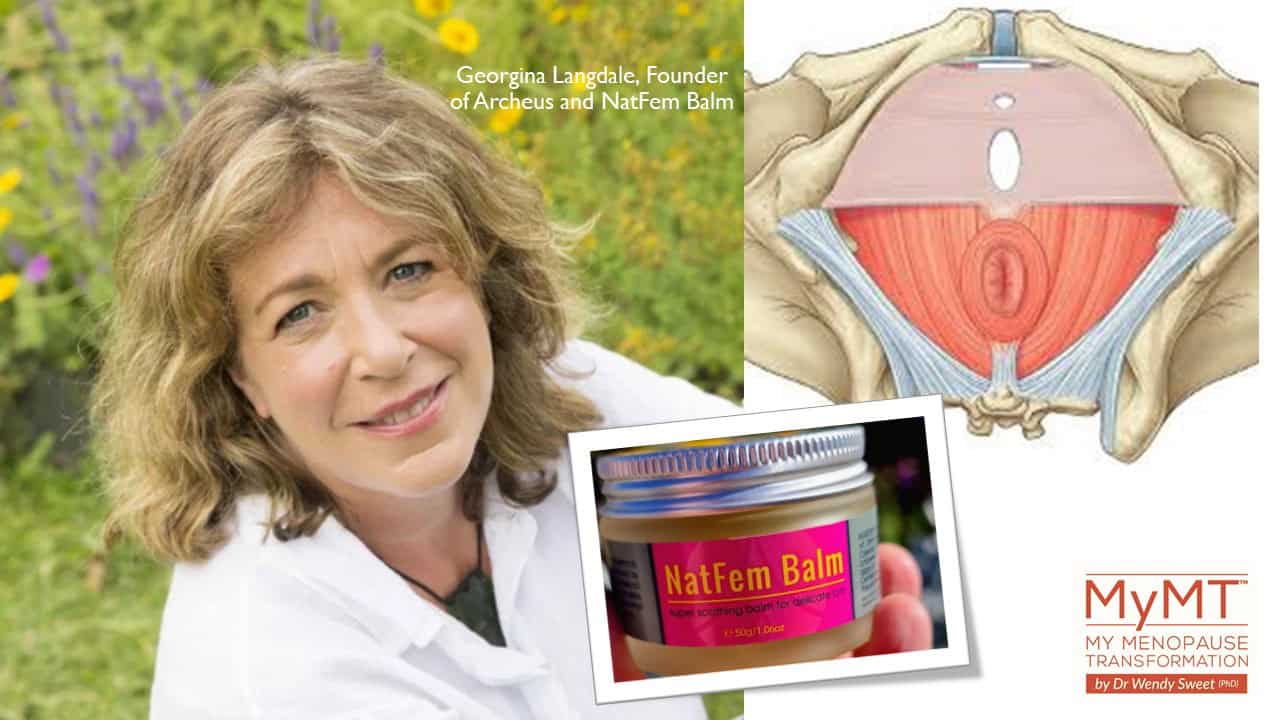
Changes to your Vagina in Menopause:
As many of you will be finding, with menopause comes a loss of elasticity of our tissues. From our skin to our blood vessels, bladder and muscles, our tissues are losing the role of oestrogen too. With age, your vagina becomes less elastic, shorter and narrower and the vaginal opening becomes smaller. And yes, whilst there is the old adage of ‘use it or lose it’, sometimes it all becomes too painful and/or dry to enjoy the intimacy that you once had. But all isn’t lost and whilst this may be a sensitive topic to talk to your Doctor or Specialist about, you must get it checked out, as there are numerous other vulva-vaginal health problems that Doctors will look for and offer you treatment options for you to discuss and explore.
Oestrogen is the primary hormone that regulates the physiology of the vulvo-vaginal tissues. Vulvovaginal atrophy is the term used to describe the specific atrophic (shrinking) changes of the vulva and vagina that occurs progressively in all women after menopause. It is also regarded as a condition in itself because the characteristic changes due to declining oestrogen can result in a range of symptoms, such as vaginal dryness, irritation and discomfort. Many of you may know this already because you’ve experienced it.
Like all things I talk about, I am passionate that we have to educate ourselves as we reach mid-life. I’m always telling the women in my coaching communities that knowledge is power, so remember that as your hormone levels fall (whether you are on HRT or not), your reproductive system and organs are ageing and changing. For our ‘nether-regions’ this means:
- Internal vaginal walls become thinner, dryer and less elastic. This means that they can also become irritated and of course, you may then be more prone to infections, including urinary tract infections. So managing inflammation and your diet is important as well as whatever your medical specialist suggests too.
- The external genital tissue thins and shrinks. This is why numerous Doctors prescribe oestrogen creams and pessaries.
- Your pelvic floor ligaments are changing too. I have an entire Pelvic Floor module in my Rebuild My Fitness programme for women and this is because ligaments become less elastic as oestrogen levels naturally decline. This means that there can be some shifts in the organs that your pelvic floor ligaments hold up. This includes your uterus (if you have one), your bladder and the wall of your bowel. It’s no wonder that some incontinence and/or a prolapse can occur as we move through menopause, so again, talk to your Doctor and see a Pelvic Floor rehab specialist as well.
Whilst localised oestrogen treatment cream is usually the preferred treatment by your Doctor, don’t forget that your diet is important as well. Some of you might even want to try the herbal balm from Archeus and of course, as all the women on my programmes discover, when you change your diet to include more fatty acids, especially from Extra Virgin Olive Oil and other foods high in Omega 3, then these types of foods are well evidenced as part of the Mediterranean Diet which is evidenced to reduce inflammation. As well, if you listen to my online JOINT HEALTH module, (which is in my programmes but can also be purchased separately) then you will discover the power of olive oil and the evidenced compounds (oleuropein and hyroxytyrosol and oleocanthal) that take over the role of oestrogen as we age. (Preedy & Watson, 2020)
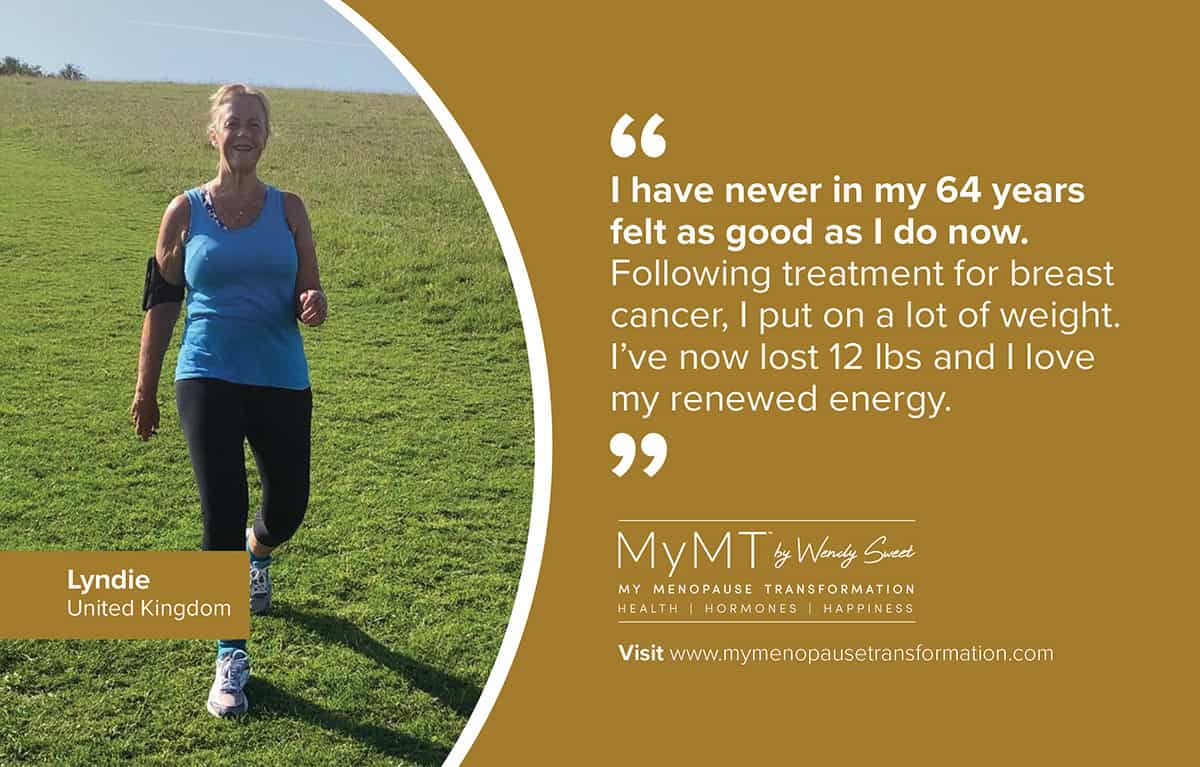
Extra virgin olive oil is one of the main ingredients of the Mediterranean diet, one of the healthiest ways of eating in the world. In the MyMT™ programmes, I have adjusted this to better suit our specific symptoms in menopause, and this includes the intake of olive oil and fatty fish.
Extra Virgin Olive Oil is now recognized for its health properties beyond those attributed to its fat profile and for women experiencing vaginal dryness and inflammation, this research matters. For more than two decades, evidence has been mounting into the role of the powerful bioactive compounds in Extra Virgin Olive Oil. It is now well established that the biophenols found in Extra Virgin Olive play a key role in the health attributes pertaining to this oil, particularly their antimicrobial, antioxidants and anti-inflammatory properties. If you can, buy good quality oil and have around 2 tablespoons daily to help reduce inflammation. Other foods high in Omega 3 fats which help your body to heal are, oily fish, walnuts, and olives.
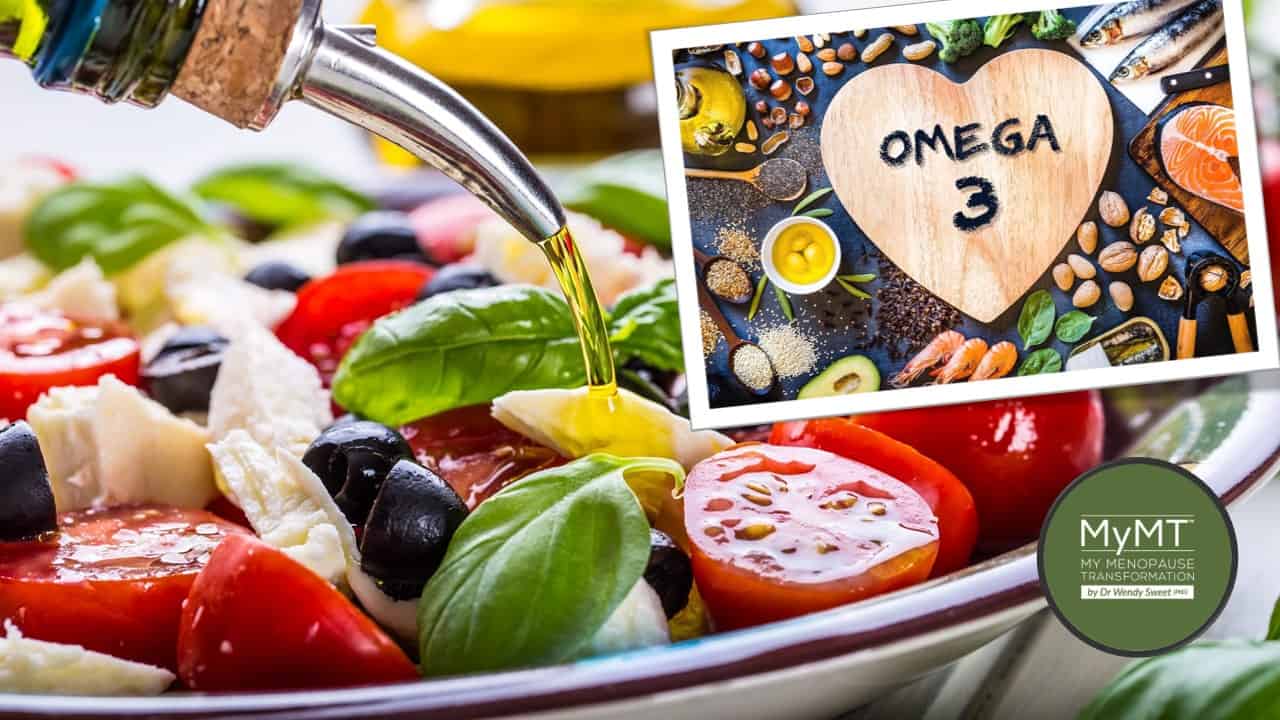
Your menopause symptoms are your body attempting to compensate for the changing balance between your hormones. Sometimes, those same hormones end up fighting each other instead of adjusting. But every one of your symptoms is reversible if you change your lifestyle and allow your body to adapt to its ‘new normal.’ This is what MyMT™ delivers to you – all the scientifically evidenced step-by-step strategies which help you to understand how to work with your changing hormones in menopause, not against them.
I have two main programmes – one focused on reducing the severity of menopause symptoms and the other on stopping and then reducing uncontrolled menopause weight gain. Each programme consists of seven modules or steps progressively delivered to your inbox. In these, I teach you essential strategies which will help you restore your natural hormone balance so you progress through menopause and into post-menopause feeling your best. I hope you can join me sometime and use the promo code JOIN MYMT, which gives you savings of NZ$50 making these fabulous 12 week programmes and my coaching only NZ$349 (approx. AU$317, UK£165 and or US $206). All programmes come with the option of monthly payments for 3 months.
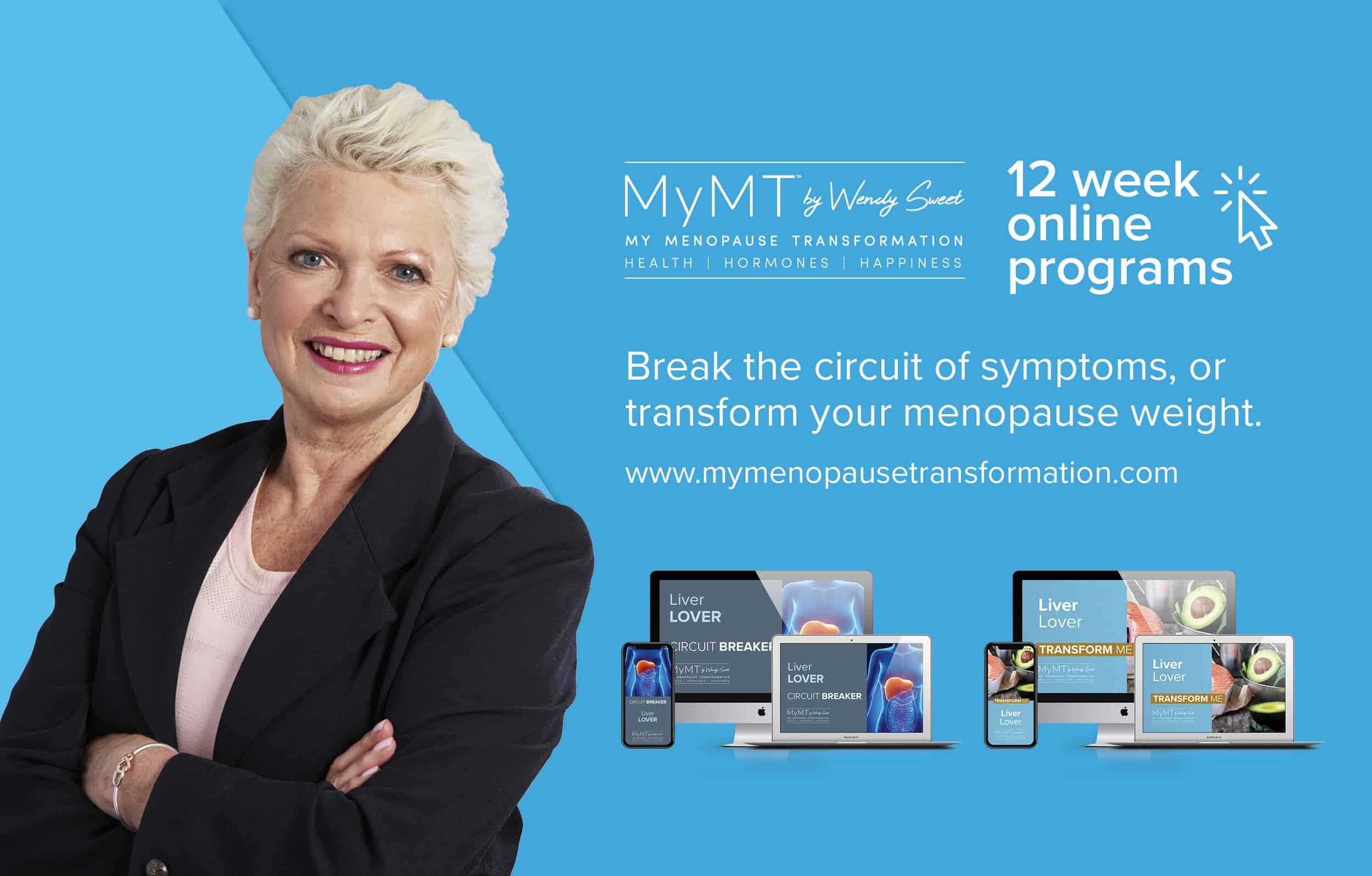
References:
Cicerale S, Conlan XA, Sinclair AJ, et al. (2008). Chemistry and health of olive oil phenolics. Critical Reviews in Food Sci Nutr. 49:218–236.
Fitzpatrick, K. (2018). Foraging and Menstruation in the Hadza of Tanzania. Doctoral Thesis. Department of Archaeology & Anthropology, University of Cambridge, England.
Harvard Women’s Health (2020). Don’t ignore vaginal dryness and pain.
Kingsberg, S., Wysocki, S. et al (2013). Vulvar and Vaginal Atrophy in Postmenopausal Women: Findings from the REVIVE (REal Women’s VIews of Treatment Options for Menopausal Vaginal ChangEs) Survey. The Journal of Sexual Medicine, 10(7), 1790-1799.
North American Menopause Society. (2013). Management of symptomatic
vulvovaginal atrophy: 2013 position statement of The North American
Menopause Society. Menopause;20:888–902.
Preedy, V. & Watson, R. (2020). The Mediterranean Diet: An evidence-based approach. London, UK: Academic Press, Elselvier
